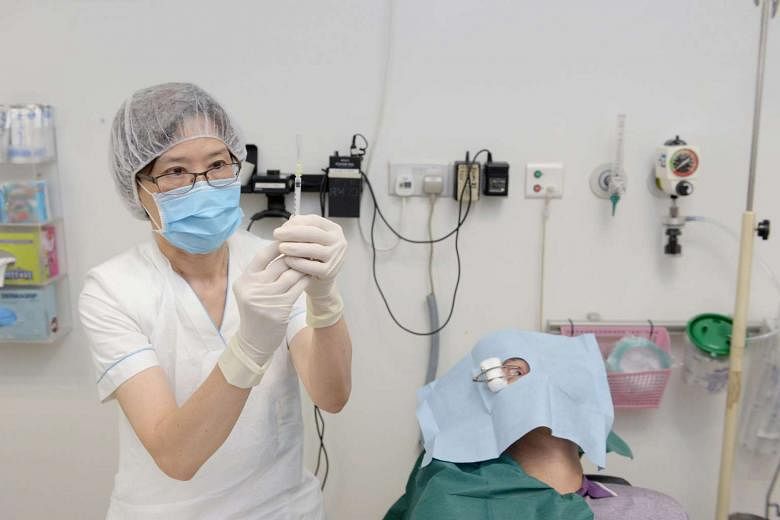SINGAPORE - Mr Han Boon Huat, 68, has to get an injection into his eye cavity every month at Tan Tock Seng Hospital (TTSH) to improve his age-related macular degeneration, an eye disease that blurs his vision.
But unlike many other patients who get such intravitreal (IVT) injections, Mr Han is among the first at the hospital to have the injections administered by a nurse. Previously, the procedure was only carried out by doctors.
"As long as they are trained, it doesn't really matter if the injection is carried out by a nurse or a doctor as I felt no significant differences during the injection," he said.
Since April last year, nurses at TTSH have been trained to administer IVT injections on patients. Conditions that require the shot include wet age-related macular degeneration, diabetic maculopathy and retinal vein occlusions.
The procedure involves medicine being injected directly into the eye cavity, allowing the effect of the medicine to be localised and concentrated to the eye and not to the rest of the body, making the treatment more effective.
Many of eye diseases are associated with diabetes, a common condition among Singaporeans with one in nine residents being diabetic. About one-third of diabetic patients would experience some form of diabetic retinopathy prevalence, which threatens their vision. They would then require the IVT injection to manage the condition.
The demand for IVT injections at TTSH has increased, with 528 jabs administered in 2013, compared with 6,508 last year. Based on current trends, this number is set to increase.
However, at its current capacity of 6,500 injections a year administered by doctors, the hospital's eye clinic is unable to meet the growing demand.
Training nurses to do the procedure will translate into less waiting time for patients. Currently, the typical waiting time for an appointment is one to two weeks, and doctors are sometimes required to carry out the procedure after clinic hours. Having nurses take over also frees up time for doctors at retina clinics to accept new cases.
Nurses will have to be selected to be part of the service, and will go through a specially designed curriculum that includes lectures, e-learning, hands-on sessions and tests.
"I was really glad and excited to be given the opportunity to learn something new, and I believe that taking on bigger responsibilities is a trend for nurses to go into for the future," said Ms Chow Peck Foong, 59, a senior staff nurse who has been on the job for more than 30 years.

